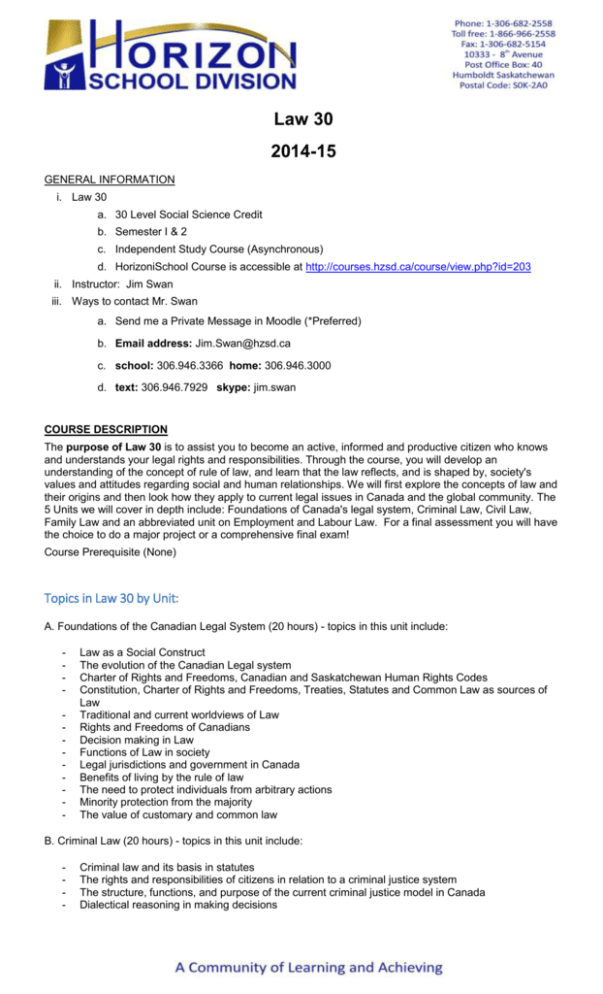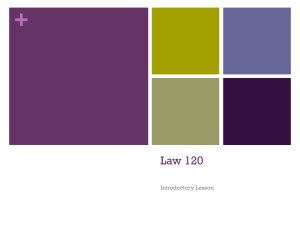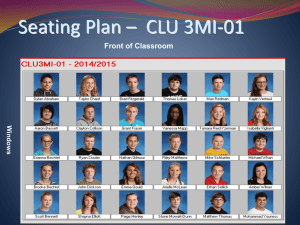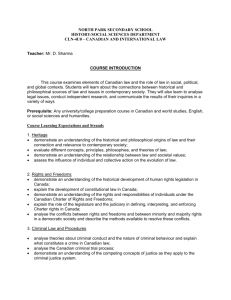Law 30 Course Syllabus Jim Swan 2014-15
advertisement

Law 30 2014-15 GENERAL INFORMATION i. Law 30 a. 30 Level Social Science Credit b. Semester I & 2 c. Independent Study Course (Asynchronous) d. HorizoniSchool Course is accessible at http://courses.hzsd.ca/course/view.php?id=203 ii. Instructor: Jim Swan iii. Ways to contact Mr. Swan a. Send me a Private Message in Moodle (*Preferred) b. Email address: Jim.Swan@hzsd.ca c. school: 306.946.3366 home: 306.946.3000 d. text: 306.946.7929 skype: jim.swan COURSE DESCRIPTION The purpose of Law 30 is to assist you to become an active, informed and productive citizen who knows and understands your legal rights and responsibilities. Through the course, you will develop an understanding of the concept of rule of law, and learn that the law reflects, and is shaped by, society's values and attitudes regarding social and human relationships. We will first explore the concepts of law and their origins and then look how they apply to current legal issues in Canada and the global community. The 5 Units we will cover in depth include: Foundations of Canada's legal system, Criminal Law, Civil Law, Family Law and an abbreviated unit on Employment and Labour Law. For a final assessment you will have the choice to do a major project or a comprehensive final exam! Course Prerequisite (None) Topics in Law 30 by Unit: A. Foundations of the Canadian Legal System (20 hours) - topics in this unit include: - Law as a Social Construct The evolution of the Canadian Legal system Charter of Rights and Freedoms, Canadian and Saskatchewan Human Rights Codes Constitution, Charter of Rights and Freedoms, Treaties, Statutes and Common Law as sources of Law Traditional and current worldviews of Law Rights and Freedoms of Canadians Decision making in Law Functions of Law in society Legal jurisdictions and government in Canada Benefits of living by the rule of law The need to protect individuals from arbitrary actions Minority protection from the majority The value of customary and common law B. Criminal Law (20 hours) - topics in this unit include: - Criminal law and its basis in statutes The rights and responsibilities of citizens in relation to a criminal justice system The structure, functions, and purpose of the current criminal justice model in Canada Dialectical reasoning in making decisions - Crime statistics Adversarial system Models for addressing criminal behaviour Alternate dispute resolution mechanisms C. Civil Law (20 hours) - topics in this unit include: - Differences between civil and criminal law Torts Compensation for harm Personal freedom in relationships includes responsibilities The legal system as a dispute resolution mechanism Role of tort law D. Family Law (20 Hours) - topics in this unit include: - Obligations created by membership in a family unit Separation, divorce, property rights, and custody of children Legal wills E. Labour and Employment Law (20 Hours) - topics in this unit include: - Fair workplace practices Statutes that promote fair workplace practices Responsibilities of employers and employees STUDENT LEARNING OUTCOMES: The general Learning Goals of the Law 30 program are to help students to: • understand that law is part of everyday life • understand fundamental legal principles, practices and consequences • recognize, accept and act upon their legal rights and responsibilities • develop knowledge, skills and positive attitudes about the law • develop problem-solving and decision-making skills with regard to legal issues and problems • develop critical analysis and dialectical thinking skills, including the ability to evaluate and resolve lawrelated issues • communicate effectively to share their understanding and ideas, and to share and defend their opinions • develop an appreciation of the individual's ability to influence the law • explore law-related career opportunities and options • develop skills in working independently, as well as collaboratively and cooperatively. Unit 1: Foundations of Canadian Legal System Knowledge • Know that Law is a social construct of society in which it is implemented • Know that the Canadian Legal system has evolved over time and has been influenced by several traditions. • Know that the Charter of Rights and Freedoms and the Saskatchewan and Canadian Human Rights Code provide criteria to assess legal rights. • Know the sources of Law include the Constitution, The Charter of Rights and Freedoms, Treaties, statutes and common law. Skills • Differentiate between traditional and current worldviews of law. • Investigate rights and freedoms to which all Canadians are entitled. • Practice making decisions by analyzing data and applying criteria. • Identify functions of law in society • Categorize various legal jurisdictions of levels of government in Canada. Values • Understand that statutes evolve as the societal standard of norms and mores changes. • Appreciate the benefits of living by the rule of Law. • Appreciate the need of the minority in society for protection from tyranny of the majority. • Respect the value of customary law and common law law in Canadian society. Unit 2: Criminal Law Knowledge • Know that the criminal law is based in written statutes. • Know the rights and responsibilities of citizens in relation to the criminal justice system. • Investigate the structure, functions and purpose of the current criminal justice in Canada. Skills • Apply criteria as a basis for testing models. • Apply dialectical reasoning in making decisions. • Research to gather specific data regarding crime statistics. • Apply inquiry skills to issues. Values • Appreciate the nature of the adversarial system. • Appreciate the role of procedural safeguards in the criminal justice system. • Contemplate models for addressing criminal behaviors. • Appreciate the history and philosophy of alternate dispute resolution mechanisms. Unit 3: Criminal Law Knowledge • Know the similarities and differences between criminal and civil law. • Know the three types of torts, including negligence, intentional torts, and strict liability. • Know that civil law is concerned with compensation for harm done rather than punishment. Skills • Identify relevant facts from information. • Develop and select criteria as a method of assessing data. • Analyze facts to draw conclusions using criteria. • Apply law of torts to everyday experiences and relationships. Values • Appreciate that personal freedom in relationships includes responsibilities associated with standards of care. • • Appreciate that our legal system and the rule of law are mechanisms for settling wrongs and repairing damage in a non-violent manner. Appreciate the role of tort law in deterring harmful behaviors. Unit 4: Family Law Knowledge • Know the social and legal aspects of the rights and obligations created by membership in a family unit. • Know the legal and social issues associated with separation, divorce, property rights, and custody of children. • Know the reasons for, and components of, legal wills. Skills • Identify and apply criteria to make decisions. • Apply criteria as a means of evaluating models. • Create models to reflect current societal needs and values. Values • Appreciate the complexity of family relationships. • • Recognize the value that society places upon the family as a socialization unit for its members. Appreciate the changing nature of family structures. Unit 5: Labour and Employment Law Knowledge • Know the terms and conditions associated with fair workplace practices. • Become familiar with statutes that promote fair workplace practices and fair treatment in the workplace. • Know the responsibilities of employers and employees in the workplace. Skills • Develop skills that will enable students to act on fair workplace practices. • Apply criteria as the basis for making judgments. Values • Develop an awareness of the workplace procedures that must be followed in the workplace. • Appreciate the benefits to employers and employees of fair workplace practices. TEACHING STRATEGIES: The majority of this course is based around online Law 30 course in moodle. I wanted to create a blend of online and offline activities so that some of the course could be worked on even if access to the internet was slow or unavailable. This course provides plenty of learner choice in ways to learn and respond to your understandings. Inquiry and exploration are encouraged in many of the “Go Deep”, end of unit Choice assignments and in your major project. In general each lesson consists of a reading and a video lesson to watch so that then you will have the required base to complete the assigned activities. Many of the activities/assignments within the course will require you to access websites, research and to present your understandings through video, podcasts, web tools and written responses. Based on big questions the Unit Exams are open book and open people. You are encouraged to get others to critically read your prepared responses and support your answers with cited sources as Law is based on precedents. The Major project will require plenty of planning in advance and conversations with your teacher. You will be required to log into moodle regularly and participate in the online discussions so that we can learn from each by reading and commenting on each other's learning! A twitter feed and a shout box are also available within the course for students to carry on learning conversations and to get to know each other as classmates. Course Schedules Semester 1 students - 2014-15 Unit of Study Unit 1: Introduction to Law Unit 2: Criminal Law Unit 3: Civil Law Unit 4: Family Law Unit 5: Employment Law Major Project or Final Exam Dates Exam September 8 - Oct 10 October 13 - Nov 3 October 13 Nov 4 Nov 4 - November 24 November 25 - December 15 December 16 - January 8 November 25 December 16 No Exam * questions will appear on Final Jan 8-20 Select date: Jan 20-23 Dates Feb 2 – February 27 Mar 3 -March 27 March 31 - April 23 April 25 - May 19 May 20 – June 5 Exams Mar 2 March 30 April 24 May 20 No Exam * questions will appear on Final June 6 -20 DUE - June 20 Semester 2 students - 2014-15 Unit of Study Unit 1: Introduction to Law Unit 2: Criminal Law Unit 3: Civil Law Unit 4: Family Law Unit 5: Employment Law Major Project or Final Exam There are no specific assignment due dates in this course. Students are welcome to complete modules in any order they wish. Unit of Study Unit 1: Introduction to Law Essential Questions Do we need law? What makes up the Foundation of Canadian Law? What is the relationship between individuals and the legal system? What is justice? Unit 2: Criminal Law Is crime a normal part of society? What are the elements/causes of crime? What purpose does civil law serve? Is there a need for family law or are these simply personal matters for families to deal with? How do employment laws work for you? Unit 3: Civil Law Unit 4: Family Law Unit 5: Employment Law COURSE MATERIALS There is no required textbook, videos or workbooks for the course. The online course itself is resource based and all the materials required for this course are included in it. A complete study quide and notes that can be printed off is included! The "All About Law" text by Nelson is not required for the course but may be a very handy research tool for the case studies and major project. Other resources: This course makes extensive use of a PC, a mobile device and broadband internet to access, learn, create and submit your course work. Depending on what you choose as a major project you may need to access Law Institutions and resources within Saskatchewan. EVALUATION: Marks Breakdown: 1) Units of instruction are worth 60% of your final mark. Unit Portfolio Assignments – 5% “Your Choice” – End Of Unit Assignments – 5% “Go Deep” Unit Assignments – 10% Unit Tests (choice based open book) – 40% 2) Case Studies/Current Events (to provoke legal thought) – 15% 3) Final Evaluation - Outdoor Experience or Inquiry Project - 25% A) A media based project that studies a Canadian Legal Case/Issue in detail will be worth --- OR--B) A comprehensive Final Exam. All assignments, end of unit assessments (choice/go deep), quizzes and the major project are to be submitted digitally within your course. In general I will return submissions within a day or so and will use one of the following rubrics below to evaluate. A comprehensive rubric is presented along with the major project within the course should you choose to do that option over the final exam. Assessment Beliefs Ultimately I want you to learn the bigger concepts of each Unit and provide every opportunity for success: 1. Content is not assessed, understanding is. If you can google it as content, you don't have to "learn" it. 2. No assignment is done evaluation until you are happy with your mark. You can resubmit as assignment again. Be reasonable here though! At times I may not be happy with the first submission and may ask you to simply redo. 3. "Borrowed" Answers - if there is evidence of cut and paste responses I will ignore the submission and ask you to resubmit 4. Learning is a conversation. I will provide meaningful feedback on your assignments and may at times ask for you to respond back. Please do and feel free to ask questions along the way to clarify you learning. Mr. Swan Unit Assignments Rubric Concept 5 fully meets expectations with enriched understanding Your show a deep understanding of the concepts and topics presented in this assignment. You have applied critical and creative thinking to a exceptional response. 4 Fully meets expectations 2-3 Somewhat to mostly meets expectations 0-1 Does not meet assignment expectations You demonstrated understanding of the concepts and topics presented in this assignment but your response needs to be further developed and thought out. You demonstrated partial understanding of the concepts and topics presented in this assignment. Your response needs to show evidence of thought to each question. Responses are very shallow and do little to demonstrate your understanding of the concepts and topics presented in this assignment. Precedence, relevance and cited sources support answer. You answer is well supported with examples and previous law cases and sources cited where possible. Your attention to detail and further insight and questioning enhance your understandings. You answer is well supported with examples and previous law cases and sources cited where possible. You answer is not well supported with examples and previous law cases and sources cited where possible. Your answer is irrelevant and may contain personal opinion and bias. It lacks precedence, relevance and cited sources support. Quality of written assignment * It is my expectation that your assignment would be written with proper grammar, organized for my understanding and completely answered. If your assignment falls short of reasonable length, grammar, organization and readability you will be required to resubmit it. Understandings End of Module/Go Deep Assessment Rubric Throughout the course you are expected to participate in case discussion forums. You are required to make one intelligent post of your own using the case study analysis guide and response to one other post - interjecting a new idea or thought each time. When participating in online forums you must remember to follow forum etiquette by being polite and trying hard to show enthusiasm and energy and not to post just to fulfill the requirement of posting. You must try to push the conversation forward through the SEE Model! ie: Make a statement, follow up with an example, and then explain what you mean. Case Studies Forums Participation Rubric: Criteria Development of Ideas Evidence of Critical Thinking Clarity Responds to Other Students and Teacher Posts Advanced (3) Proficient (2) Not Yet There (1) Not There at All (redo) Poorly developed ideas which do not add to the discussion Does not enter the discussion please do so. Well-developed ideas; introduces new ideas, and stimulates discussion Developing ideas; sometimes stimulates discussion Clear evidence of critical thinking-application, analysis, synthesis, and evaluation. Postings are characterized by clarity of argument, depth of insight into theoretical issues, originality of treatment, and relevance. Sometimes include unusual insights. Arguments are well supported Beginning of critical thinking; postings tend to address peripheral issues. Generally accurate, but could be improved with more analysis and creative thought. Tendency to recite facts rather than address issues Poorly developed critical thinking of what was learned Does not enter the discussion please do so. Posts are well articulated and understandable Posts are understandable, but some thought is required Posts are difficult to clarify Posts are unintelligible or not present – please redo Interacts at least once with other student or Teacher Does not enter the discussion please do so.





